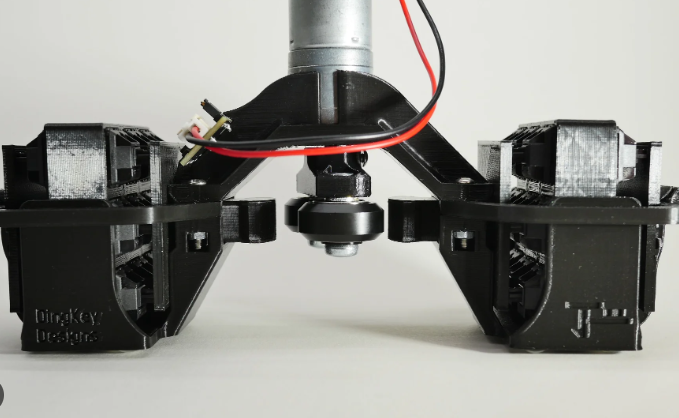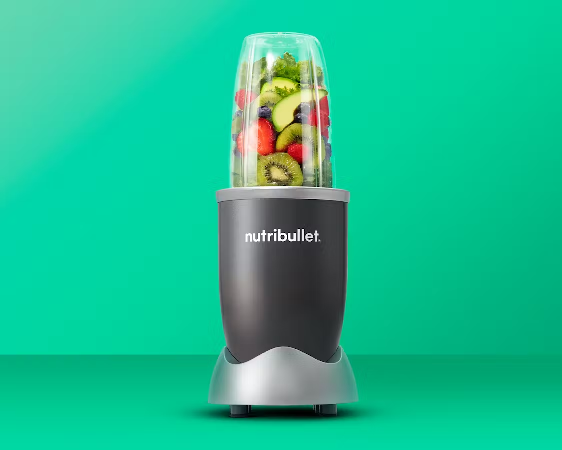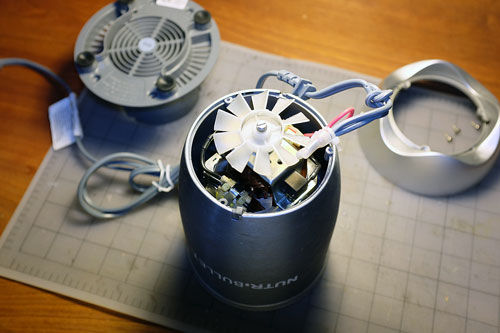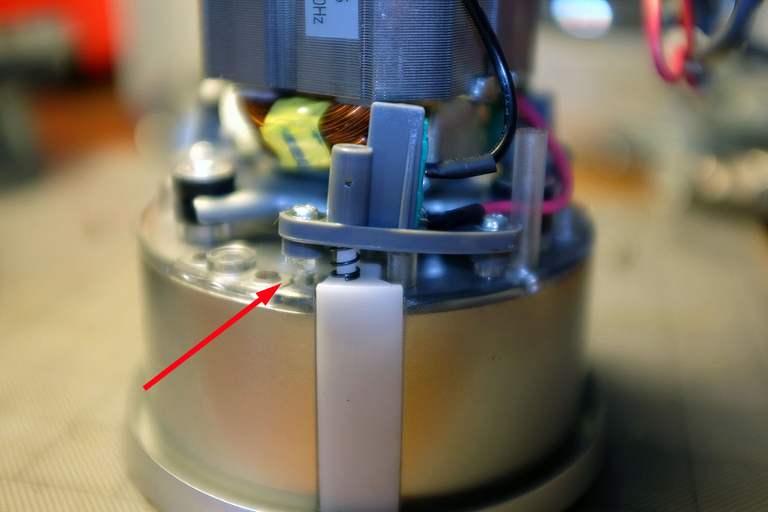Made to Break

I've done posts on Planned Obsolence before.
But recently I've had my own personal experience firsthand with a product that looks like it was designed to break on purpose and I thought I'd share it. In this particular case we'll be talking about the Nutribullet Blender. Apparently this is a product made in Taiwan with a parent company called Capital Brands. Never heard of them until just now looking it up.
Backstory
So in this particular case my girlfriend and I have been making a more conscientious effort to incorporate a healthier diet than we had before. We've been drinking a lot of smoothies for breakfast, which I thought was weird at first, but then again how else is one going to incorporate kale into a breakfast food?

So we bought one of these bad boys.
The nutribullet is an extremely convenient and nice product (when it actually works). Unlike a regular blender where the teeth are on the bottom of the device and can be a bit annoying the clean, this thing is built so that the spinny bits are screwed in to the top of modular cups that get turned upside down into the motor. This makes them a lot easier to clean on top of the blend being a bit more superior than the normal type of blenders I've used in the past. All in all it's good product with a solid model.
The power on this thing is also quite impressive. Looks like it draws about 600 watts of electricity, which isn't a ton compared to other appliances like a microwave that might draw two or three times more than that, but when all the power goes just into spinning a few tiny teeth around it's got quite the kick and a lot of torque. In fact it draws so much power that it can only be run for about 1 minute at a time. More than that and one risks overheating the motor or potentially burning it out. I saw the heatsink on the motor and it looks like it belongs inside a high performance gaming computer. Interestingly enough 1 minute on this thing is often 5-10 times longer than what is required for the current task at hand. It's quite fast and it only has one speed setting.
But then it broke
In fact it broke quite quickly: say one month. My girlfriend was pretty annoyed about this for various reasons: probably most of which was is the process of getting a replacement. See these things have a year warranty on them so we were basically owed a new one.
The problem with this, much like any insurance policy, is that when something goes wrong the corporation often looks for any excuse not to pay up. They like to gaslight; they like to 'blame the victim' to try to get out of their responsibilities as this will save them money in the long-run. In this case they even annoy the caller into giving up, apparently.
We were asked if the blender made a "clicking sound" when we inserted the cup into the base. It did not, and the response to this was that perhaps maybe the device was dirty and we should clean it with warm water and soap for 5 minutes on each plastic trigger. There are 3 triggers and I heard my girlfriend say, "So you're going to sit here on the for 15 minutes while I clean these plastic buttons?" Everyone involved in the situation knew it wasn't going to fix anything. It's not like they were mucked up with food or anything: they were already fairly clean. Honestly I thought it was weird that the suggestion here is to get water inside of an electrical device. Is that safe, I thought? It must be as this person telling us to do the thing is legally liable if anything goes wrong. Obviously the device was unplugged at this time, but still.

All of these things (and more) became clear the second time around.
So we got a replacement, but red-tape like that takes a while, and we had become a little bit dependent on the blender on a day to day basis, so I just bought another one immediately from Amazon prime. We got the warranty replacement a week or two later and my suggestion was to just keep it as a backup in case it breaks again. Instead we just gave it to a family member because they wanted it and we had an extra, which was fine.
Lo and behold the Nutribullet broke again.
This happened just a couple of days ago. This time the blender lasted about 3 months, which is obviously three times longer than one month but also well within the 1-year warranty period. We've yet to decide if getting a replacement is even worth the hassle of talking to someone. I'm certainly not going to do it, so I guess it's up to my better half to pull the trigger.
Speaking of triggers...
Because I was the one who actually bought the device this time around I was a bit more emotionally invested in the process. At this point I was curious what the problem was and wanted to figure it out, so I pulled out a Phillips-head screwdriver and took the stupid thing apart. I'm not particularly handy or anything but sometimes I like to try.

What I found was... interesting
And also let it be known the the vast majority of advice given online for fixing a broken Nutribullet blender tends to be worthless, which I found out immediately upon opening up the tower.
If you suspect that the activators may be the reason why your NutriBullet is not starting then turn the power off, remove the cup, and gently clean the activators with warm water.
Uh huh... sure bud.
So I got this thing open and immediately noticed that it's designed very well and appears to be a pretty high-quality product for the price ($60). The motor is absolutely beefcake. The heatsink is massive. Everything fit together quite well and it was very easy to take apart AND put back together (a rare feat indeed). Everything was solid except for one tiny bottleneck.

The trigger.
A Nutribullet has 3 plastic buttons you have to push down at the same time in order to turn on the device (Or so I thought). This is a pretty useful safety-measure for a kitchen appliance that spins very fast with high torque and overheats quickly. However, when I actually opened it up it became instantly apparent that one of the buttons is simply a placeholder that does nothing except keep the other 2 buttons stable. Fair enough. Stability is important. Just ask crypto.
One trigger has a black wire and one trigger has a red wire. The assumption being that the black wire is the ground (no power) and the red wire is the live wire that actually cranks electricity through the device. The pictures I'm using are not my own and are from this other blog I found that had the exact same problem as me (no surprises there)
In any case.
Like I said before, the entire device is clearly built very well except for the actual triggers that turn the stupid thing on. This makes perfect sense when dealing with a potentially dangerous product that's designed to break on purpose.
There are many things that could go wrong. It spins fast, it gets hot, and it can theoretically electrocute you. If the user were to actually get hurt because of their shoddy design that would end up being a legal nightmare costing the company millions of dollars. Instead make the device super solid and program the triggers to fail: that's the way to go for planned obsolescence; no lawsuits.
So what's wrong with the trigger?
That "clicking" sound tech support was talking about is actually a sound made by the trigger signifying the circuit has been made. Both the ground and the live wire need to click into place for the circuit to fully complete. However, the tiny frame of the trigger that connects to the main chassis of the device is seemingly flawed on purpose. It screws into these plastic cylinders that shatter quite easily. I'm sure these things have a name and some guy patented them and made a bunch of money, but I have no idea what they are called. This other blog generically calls them "posts" which seems to make sense.
Long story long
The post that connects the trigger to the tower shatters and then the spring-loaded proxy buttons are unable to properly hit the trigger. The device stops "clicking" and completely fails to operate as intended.

This actually enraged me.
Not because the blender was broken; not even because it is seemingly on purpose, but because the company tries to gaslight you into thinking it's your own fault that the device doesn't work. "Oh maybe you spilled food in there and should clean it out." They fucking know exactly what fucking happened and they act like they don't, and that's bullshit. The device is literally designed to break in this exact way.
Consumers must consume
Like I said before this thing is so well made that if it wasn't for this dogshit triggers failing a product like this might last a decade or two before actually failing from a legitimate problem. Can't have that! How are you going to sell more blenders if they last forever!?! lol seriously though. Capitalism is dumb.
So now the only question left is that did we simply get unlucky for these posts to fail well before the 1-year warranty was expired... or were we actually doing something to make them fail early? I'll be honest that I never make the smoothies and I've actually never even used the appliance myself... ever (except when I was trying to fix it).
I suspect what happened is that the cups were being slammed into the device with a higher than average force than the average person. Maybe even with two hands and body weight on top of that. I lightly accused my girlfriend of doing this because she's a bit of a slammer and a stomper by nature, but he denied it in a way that... let's be honest, convinces me even more that this is what happened. Either that or we got EXTREMELY unlucky twice in a row which seems... unlikely.

Mathematically unlikely.
If you're designing these triggers to break and the device has a one-year warranty... then on average the triggers need to fail after like two years in order to avoid excessive warranty claims. What are the odds that we get two blenders that fail after one month and three months if the average is 2 years? Might even be more than 2 years because they offer a 3-year extended warranty. I would guess the chance of that happening is less than 1% unless we were doing something to speed up the process of trigger failure, which seems likely in this case. Not that this is our fault in the slightest bit.
So did I fix it?
Uhhhh... no... I could hit both triggers by hand and turn on the device while it was exposed and outside of the tower, but that was not the safest thing in the world. I even tried to pull the live-wire trigger to the outside so it could be clicked by hand, but it was just a tiny bit too short for that and also would have been unsafe. Like... what happens if it got water on it? It is sitting on a kitchen counter after all.
During all this multiple other posts on the device also shattered somehow. At first only the live-wire trigger was broken but then I noticed that somehow both the other posts were shattered as well at some point. It would have been possible to use a very strong glue to replace the posts, but I would have needed some kind of clamp or vice to keep them in place while the glue dried because the spring-loaded proxy buttons would push them out of place. In the end I just cut my losses, capitulated, put it back together broken, and chalked it up to a learning experience. Lesson learned. I'll probably get a refund eventually and they won't be able to dick us around like they did before.
Conclusion
It's very disappointing to come to the realization that this is how the world works now. Used to be that branding and reputation mattered. Heathy competition used to exist. Make the highest quality product for the cheapest price to beat out the competition.
Now we have this bastardized version of capitalism full of greed hacks. Marketing hacks and advertising hacks are used to trick people into thinking the brand is solid. Planned obsolescence hacks are mathematically engineered to make the most money possible. It is literally someone's job to figure out exactly when your product should break in order for them to make the optimal amount of money, and that's obviously pathetic on so many levels.
It's easy to play the what-if game in this scenario. What-if this wasn't a problem? What-if all products were high-quality and inexpensive and lasted forever? What if these greed hacks didn't exist? Well I'm sure we'd have other problems that we didn't even think of. The simulation is always exponentially more complex than the theory.
The EU has been pushing policy and legislation around The Right to Repair which I wholeheartedly support, even though it can make things super messy. Apple Inc is notorious for designing products in such a way that parts can't be easily replaced and implementing software limitations if repaired by anyone but Apple, which they do under the guise of 'ensuring quality' but is honestly just evil.
I really do think most people would prefer to repair something than buy it again, especially as daily costs increase. Why pay $800 for a new one when the broken part costs $0.50?
My favorite is buy a new printer rather than buying replacement ink. Somehow in the rare event that I need one, it's actually cheaper.
One of the tasks that I participate in at work is MTBF (Mean Time Between Failures) for all components of a computer that goes in an aircraft.
For that industry, the customers are willing to pay the full price for quality.
In general, I don't think that most consumers are willing to pay for quality anymore. If I look at companies like Kitchen-Aid, Vitamix, or Dyson, they provide a better quality product, but in order to stay profitable, their prices are higher than the average household is willing to spend.
For all three of those companies, my experience if there has been an issue (under warrantee) has been as simple as "Sir, we will ship you a replacement unit and a box for you to return the defective unit."
But unless I can find it on a major sale, I'm not willing to spend 60% of their list price.😣
For example, Vitamix's equivalent of a mini-blender would be this:
https://www.vitamix.com/ca/en_us/shop/blenders/4-piece-immersion-blender-bundle
Is it worth $260CDN if it lasts 3 years with a no questions asked warrantee? Or, is it better to spend $80CDN for a NutriBullet and go through the hassles of having it replaced within 3 months? In general, I'd go with the latter and take my chances. But If I can find the former on sale - I'll jump all over it.
Looks like something a 3D printer would fix right up in a jiffy, and if you used PETG-CF (the CF is for carbon fiber) it would probably outlast you.
Thanks!
Very interesting post. I suppose that a deliberate breakage on one component could prevent more dangerous malfunctions from other components that wear out, but one month does seem rather ridiculous!
I do think about deliberate obsolescence in the Web3 context though. Would there be sense in having Web3 gaming products that have a limited lifetime by design, and that get deliberately dismantled at the end?
These tricks to ensure that companies sell more are seen on both a small and large scale. From Apple purposely making their phones difficult to repair to Xiaomi disabling options to send app data to an SD card, making storage run out much faster and you have to buy a new phone whether you want to or not.
Even with smaller electric fan companies. The coils in the motors of these models are aluminum, a poor substitute for copper which tends to heat up and burn out much faster. Not only this, but they also implement phantom connections for speeds, in the end making people believe that the fan is changing while always spinning at the same speed.
Amazing. I have this exact product and it lasted a couple years until two new adults were staying with us and it broke almost imediately. The new adults chalked it up to it was old. But I had to wonder if they manhandled it! LOL!
By the way my hat is off to you for taking the thing apart.
Respect.
I can never get stuff together again and my wife never forgets!
LOL!
Nice nice I'm glad this was directly relevant to someone.
Good stuff.